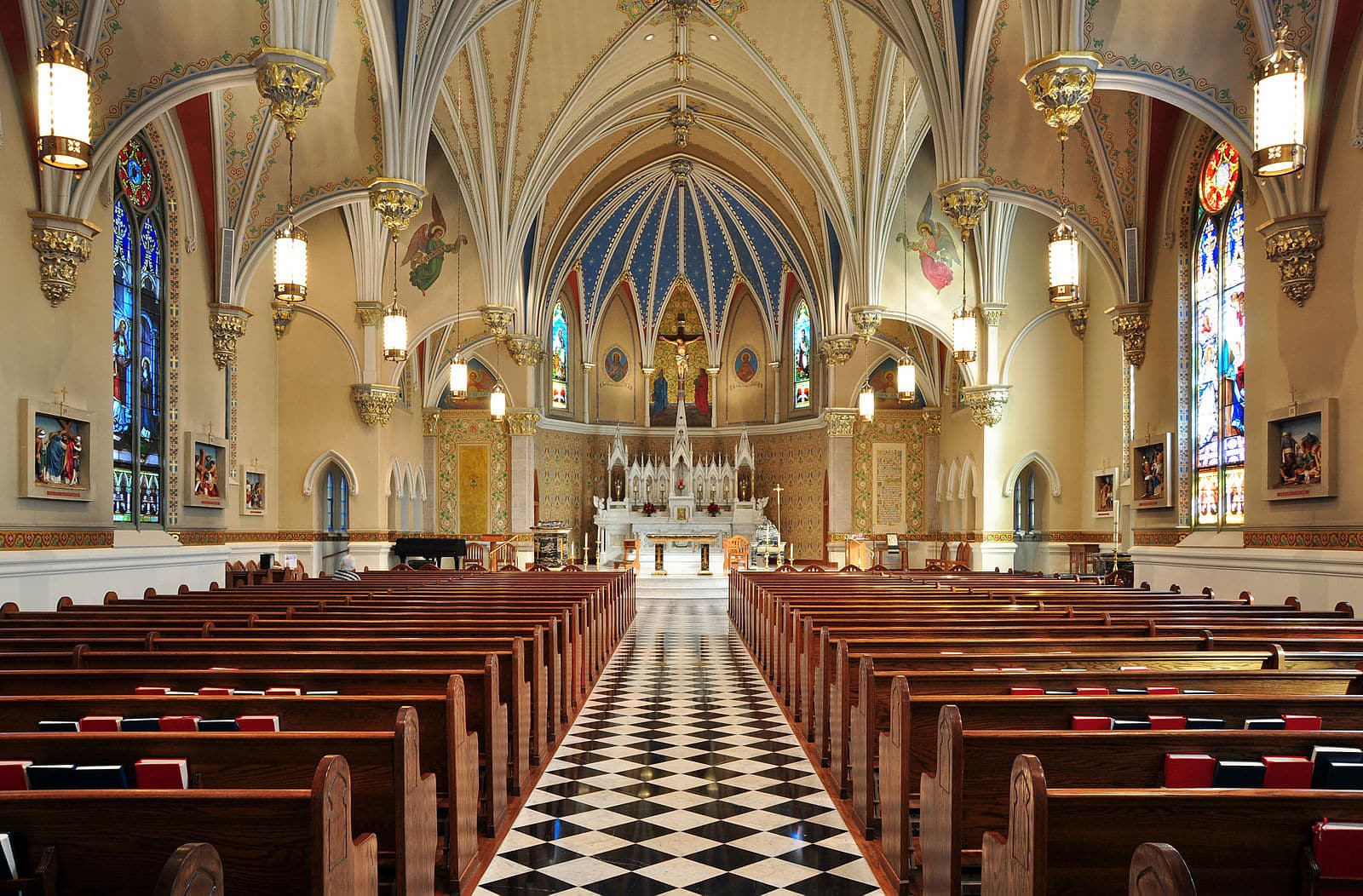Whenever a lost sheep returns to the fold, there is much rejoicing in heaven. But when the president of the Evangelical Theological Society returns to the Catholic Church, shouts can be heard throughout the universe. But of course, that comment is a bit triumphalistic, an approach Dr. Francis J. Beckwith asks his Catholic readers to avoid.
In Return to Rome: Confessions of an Evangelical Catholic (Brazos Press/Baker Publishing Group, 2009), 49-year-old Francis J. Beckwith details why he left the Catholic Church as a teen and what brought him back 30 years later.
His Ph.D. in philosophy is from Fordham University (1989), a Catholic university run by the Jesuits. He now teaches philosophy at Baylor University in Waco, Texas, “a Christian university in the Baptist tradition. ”
Beckwith’s entire adult life has been focused on academia and on his religious search. He has studied and/or taught at the University of Nevada-Las Vegas, Simon Greenleaf University, Whittier College, Trinity Evangelical Divinity School, Washington University School of Law (where he picked up a master of juridical studies degree), Princeton, Baylor and the University of Notre Dame.
His religious journey has taken him from St. Viator Catholic Parish in Las Vegas to the Neighborhood Foursquare Church in Henderson, Nevada, to becoming an ordained minister of the United Evangelical Churches (which he resigned in 2007), to being a member of the Reformed Episcopal Church in Santa Ana, California, to being in full communion with the Archbishop of Canterbury at St. James Episcopal Church in Newport Beach and, finally, back to the Roman Catholic Church and St. Joseph’s Parish in Bellmead, Texas.
Intellectual Journey, But With Family Prods
“It’s difficult to explain why one moves from one Christian denomination to another. It is like trying to give an account to your friends why you chose to pursue marriage to this woman rather than another, although both may have a variety of qualities that you have found attractive. ” So begins Dr. Beckwith’s book, and he elaborates further in a phone interview with St. Anthony Messenger last August.
His unusual returnee’s story is primarily intellectual, not a response to personal witness or inspiring stories of faithful Catholics or of Catholic converts. It’s not because his parents begged him to come back to the Catholic Church or because his wife, Frankie, “got religion ” first.
Frankie Dickerson and Francis Beckwith knew each other through Vineyard Christian Fellowship in Las Vegas, and married in 1987. She accompanied her husband on each of his denominational switches, eventually becoming a Catholic at St. Joseph’s in Bellmead, five months after her husband’s return to the Church. But Beckwith does credit his wife with prodding him back to the Church. In fact, it turns out that her father wanted to be a Catholic, but her mother would not allow it.
Beckwith’s brother Patrick used to send him postcards from The Coming Home Network (a group dedicated to bringing ex-Catholics and Protestants into full communion with the Catholic Church).
But in the end it was a question from his eight-year-old niece, Darby, about why he and Aunt Frankie weren’t Catholics, and later his nephew Dean’s wish that Francis be his Confirmation sponsor, that made him reexamine his relationship with the Church. (The Beckwiths have no children of their own, but have been very involved in their extended family.)
Not Properly Catechized
Beckwith always had a religious bent. “As a young Catholic male, I naturally began thinking that maybe I was called to the priesthood. Because I wasn’t sure what to do, I prayed and asked God to provide me with a clear indication of whether he wanted me to pursue the Sacrament of Holy Orders. As fate would have it, puberty soon kicked in and thoughts of lifetime celibacy vanished as quickly as my clear complexion, ” he humorously confesses in his book.
“On a more serious note, I still wonder what might have happened if a local priest or devout layman had taken notice of my theological exploration and offered me guidance. Perhaps such a scenario was never in the divine cards (that’s my Vegas background talking) and I wound up exactly where I was supposed to wind up. I’ll never know this side of eternity. But what I do know is that I cannot imagine life without my dear wife, Frankie, who is a true gift of God. ”
During our interview, Beckwith says he was first attracted to the “vibrancy and seriousness about their theology ” in the Evangelical Churches. “There was a real call in those churches to follow Jesus, ” he remembers.
Born and baptized in Brooklyn in 1960, he moved with his family to Las Vegas seven years later. Beckwith had been confirmed as a seventh-grader, was an altar boy at St. Viator Parish and attended Bishop Gorman High School. But he described himself as an agnostic by his senior year before he started participating in Bible-study groups with Protestants.
Beckwith admits he has no memories of the Catholic Church prior to the Second Vatican Council, and his book attributes his departure to the inadequacies of the early post-Vatican II American Church. “That Church was littered with dioceses, parishes, and schools that did not adequately catechize their young people with a clear and defensible presentation of the Catholic faith. ”
In our interview he explains further: “In the early ’70s when I drifted away from the Church, it seemed to me that there was a greater vibrancy in the Evangelical world. I was one of those kids who always was interested in debating and discussing theological issues. So I wanted answers all the time. That’s why I became a philosopher, I suppose. ”
The young Beckwith spent a lot of time in bookstores and libraries. “A lot of the authors I ran into were Evangelical authors. At the end of the day, it was a combination of just my desire to follow Christ and the attractiveness of the Evangelical authors and preachers, as well as the lack of catechesis that was part of my development and formation as a young Catholic. ”
Critical of Early Post-Vatican II Church
Beckwith is very careful not to come across as a Vatican II-basher. “I think much of Vatican II is misunderstood and was exploited by some people to try and make changes in the Church that Vatican II never intended. ”
He is critical of the way he was taught religion back then, as “a less significant thing to study than chemistry, history, physics or literature. It was treated as a kind of afterthought that anyone could do. So, for instance, in high school, my freshman religion teacher was the basketball coach.
“Why did they think that the basketball coach could teach theology? ”
Catholics, he thinks, need to remember that the Church’s rich and deep history, its intellectual and spiritual story, shouldn’t be denied to its young people. “It was only later that I discovered how much of what I liked in Protestant literature was actually Catholic. Some of the authors in Protestantism that I found to be the most intellectually engaging were people who had studied the great Catholic authors.
“There is a great spiritual tradition within the Church, which ties together one’s relationship with God with living the good life. I wish those things had been more explicitly taught to me…in a way that doesn’t sound old and stodgy. ”
Beckwith also blames a lack of sacredness in the Church back then. “I grew up after a lot of liturgical changes. When I go to church, I don’t want to think that I’m in a gymnasium. ” There was “a kind of copying the worst of Protestantism and trying to emulate it in the Catholic Church, ” which “diminished the sacredness of what’s going on in the Mass. ”
For him, this does not mean that contemporary music cannot be used at Mass, but something has to distinguish what we do on Saturday evening and Sunday from the other things that we do. He would define this as “the sacred. ”
“I don’t want to give the impression that prior to Vatican II everything was roses and sweet music. Sometimes we want to wax nostalgic about things that maybe at the time weren’t as great as we remember them. So I want to be careful not to act like there was a golden age. It’s always a mistake, I think, for any generation of Christians to take one age and think it should be normative for all Christians for all times. ”
Sticking Points, Like Justification
When Dr. Beckwith started reconsidering the Catholic Church, he had a number of difficulties with it: the Church’s view on justification, the role of faith and grace, Jesus’ real presence in the Eucharist, apostolic succession and the papacy, and the teaching authority of the Church. He looked more closely at each of these.
Flowing out of the Reformation sparked by Martin Luther, Protestants put more emphasis on Scripture than Catholics did. Many Evangelical Protestants still argue that it is Scripture alone—without recourse to Tradition—that is the heart of the Christian faith. In the years since Vatican II, the Catholic Church has begun to use Scripture more explicitly, and some Evangelicals have begun to concede the need for Tradition. But Beckwith latched on to Evangelical Protestantism before that evolution.
“How could I accept the Protestant idea of sola Scriptura, that is, Scripture alone, and at the same time reject those distinctively Catholic doctrines like apostolic succession, eucharistic realism and the Sacrament of Penance? ” Beckwith asked himself. “The very people in the early Church who decided what constituted the canon of Scripture [the official list of approved biblical books] believed those other things were obviously true. How could I cherry-pick the tradition in an intellectually honest way? And I just couldn’t. ”
He felt the burden of proof shift away from the Church and back to him. He asked himself, “How can I believe that everything Catholics are doing in the Mass and with penance and confession is wrong, but the Church is right about the Bible? I couldn’t reconcile that. ”
In his book, Beckwith frequently uses the phrase “a forensic view of justification. ” In this context, forensic refers to its legal definition. He explains, “It’s the view that Christ’s death covers over our sins. That is because Christ took the punishment we were supposed to take. Therefore, if we accept Christ by faith, God declares us not guilty. It’s not because we’re really not guilty; it’s because Christ died in our stead. ” (Theologians call this the penal substitution theory of the atonement.)
The Joint Declaration on the Doctrine of Justification, signed by the Lutheran World Federation and the Catholic Church in 1999, defines justification this way: “Justification is the forgiveness of sins (cf. Romans 3:23-25; Acts 13:39; Luke 18:14), liberation from the dominating power of sin and death (Romans 5:12-21) and from the curse of the law (Galatians 3:10-14)….It unites us with Christ and with his death and resurrection (Romans 6:5)….All this is from God alone, for Christ’s sake, by grace, through faith in ‘the gospel of God’s Son’ (Romans 1:1-3). ”
Because opposing interpretations of the biblical message of justification led to the division of the Western Church in the 16th century and occasioned mutual doctrinal condemnations, “a common understanding of justification is therefore fundamental and indispensable to overcoming that division, ” says the Joint Declaration. It also notes a “notable convergence ” between Catholics and Protestants coming out of the ecumenical dialogue on the doctrine (#13).
Dr. Beckwith read and reread the writings of the early Church Fathers such as Sts. Irenaeus of Lyons (c. 140- 202), Cyril of Jerusalem (318-386), John Chrysostom (344/345-407) and Augustine of Hippo (354-430). A great deal of their theology was devoted to trying to understand why Jesus had to die on the cross and what our redemption really means. The Reformation struggled with and reinterpreted their words. In recent times many Protestants (such as Scott Hahn and the late Father Richard John Neuhaus) converted to Catholicism after studying the Fathers of the Church.
“One of the things that I discovered by reading the Church Fathers was how one doesn’t really find the forensic view, ” Beckwith says, although he admits there is clearly a forensic element to what they understand about justification. “That is, there is a legal aspect to the infusion of grace, but it is not something that is totally external or extrinsic to one’s eternal fate. ”
Catholic theology “just says that the grace that you receive as a consequence of Baptism removes your Original Sin, and you have access to those graces throughout your life. The difference is this: The Protestant view is that grace is extrinsic. That is, justification is something that is not an internal change within you, but something that God imputes to you, whereas the Catholic view is that it’s infused. It’s something that actually changes inside you. ”
When Beckwith examined the 1999 Joint Declaration on Justification, he found, “Both the Lutherans and the Catholics agreed about the importance of works in justification. For the Catholic, works or engaging in works of charity is the way in which God’s grace works through us. Although we get merit for it, it isn’t our work that is doing it. It’s wholly the grace of God.
“On the other hand, the Lutherans—and many other Protestants—will say that good works are a consequence of justification. [They say] you don’t work in order for God’s grace to internally change you. You do good works because that’s a natural consequence of having already been justified.
“That document showed me that neither a united Protestant view nor the Catholic view can really say that works have no component to justification. They just have a different way of looking at how they function. ”
Dr. Beckwith already had a reverence for the Mass, so the obstacle of Jesus’ real presence was soon dispatched. And quibbles about the pope and the Church’s magisterium disappeared quickly as well.
So Beckwith found himself “boxed into a corner with the only exit being a door to a confessional! ”
‘For Your Penance’
On April 28, 2007, he formally came back to the Church through the Sacrament of Reconciliation. In his book, Beckwith recounts his first confession in 30 years, entering the face-to-face confessional, sitting opposite a priest from East India and struggling to recount his sins. He remembers admitting he wasn’t sure he could remember all of them. The priest reassured him, “That’s all right. God knows them. ” He responded, “I was afraid of that. ”
For his penance, the priest asked him to say one Our Father and one Hail Mary. (When he later told his wife about this, she thought the priest was far too lenient. “She has a thorough recollection of my sins, ” he says.)
Beckwith had to resign his ordination as an Evangelical minister, his elected office of president of the Evangelical Theological Society and his 20-year membership in the society. While the dust was settling, he took a year away from Baylor as the Mary Ann Remick Senior Visiting Fellow at the University of Notre Dame’s Center for Ethics and Culture in South Bend, Indiana. Having already changed from teaching Church-state studies when Baylor folded down its Church-state department, he moved back to his first love, philosophy.
The Evangelical Theological Society considered adding statements to their doctrinal statement that would make it clear that the society definitely excludes Catholics, but in the end issued a “gracious and charitable statement ” about Beckwith’s resignation. He had resigned to avoid being the focus of intense debate within the society, but continues to believe that a person can be both an Evangelical and a Roman Catholic. He says he continues to have great respect for “my brothers and sisters in Christ from whom I have learned so much in my over three decades in the Protestant world. ”
He says, “I have great colleagues ” at Baylor who accepted his religious decision, although some still ask him to explain it.
Since Coming Home
Dr. Beckwith is happy with his new religious choice. He says in Return to Rome: “My return to the Catholic Church had as much to do with a yearning for a deeper spiritual life as to do with theological reasoning. Since becoming Catholic, I have become much more prayerful, I read the Bible far more often….
“I sometimes find myself silently praying a Hail Mary or an Our Father while driving or working out. I am not averse to asking particular saints to pray for me, or to recite the prayers of some of my favorite saints, such as Thomas Aquinas. When doing this I gain a greater sense of that of which I am a part, the wonderful Body of Christ that transcends time, space and death itself.
“I have participated in such practices as saying the Rosary and praying the Stations of the Cross. These practices are good and rich, but the Sacrament of Reconciliation (or Confession) has been the most liberating aspect of my Catholic experience so far. Although many Catholics acquire a deeper walk with God through the Real Presence of Christ in the Eucharist, I have found Confession to be the place in which I experience the gratuitous charity of our Lord at its fullest. ”
Dr. Beckwith is very pleased with the “wonderful ” Catechism of the Catholic Church, which was issued while he was away from the Church: “It’s one place where someone can find what the Catholic Church teaches on virtually everything that people are interested in. I think it is written with great clarity, great carefulness. ”
He’s also impressed with the recent encyclicals of Pope John Paul II and Pope Benedict XVI. They show a careful method and a clear articulation of doctrine that weave in the Church’s history “in an eloquent way. ”
Beckwith now calls himself “an evangelical Catholic ” since evangelical comes from the Greek word for “good news ” and refers to the desire to share the Good News of Jesus Christ with others.
He quotes such famous converts as Cardinals Avery Dulles, S.J., and John Henry Newman, who saw conversion in big terms—not just as intellectual assent to doctrines but also as agreement by the whole person: mind, will and emotions.
Dr. Beckwith’s whole person is now happily at home in the Catholic Church.
Three Things Catholics and Evangelicals Can Teach Each Other
Dr. Francis J. Beckwith thinks that Catholics and Evangelicals have much to teach one another.
From Catholics, Evangelicals can learn:
How faith and reason interact. They could start with Pope John Paul II’s encyclical Ratio et Fides ( “Reason and Faith “).
That Catholics actually do care about the Bible and quote it frequently.Check out the Catechism of the Catholic Church.
The value of contemplative prayer life, especially as found in the monastic tradition, and the Catholic view of grace as changing a person from the inside out.
Besides the “vibrancy and seriousness ” of Evangelicals that first attracted Beckwith to them, Catholics can also learn from Evangelicals:
How to speak out more about their faith. Catholics tend not to be as verbal about what they believe as Evangelicals. Neighbors often don’t know the Catholics in their midst.
That faith-sharing starts (but shouldn’t stop) with our witness. Catholics excel at witness but don’t tout it. Beckwith calls his parents, who are still alive, “the most charitable people I have ever known in my life. ” Only after leaving home and reflecting on their example did he realize “how much their Catholicism influenced the way in which they lived their lives. ” Catholics need to blow their own horn a little more.
How to write in a way ordinary laypeople can understand. As a famous Presbyterian minister, Donald Greg Barnhouse, a pastor in Philadelphia between 1927 and 1960, put it, “Sometimes you have to take the hay down from the loft so the cows can eat it. ” People can only absorb spirituality expressed on their level. Catholic theologians need to learn to write and speak with a popular touch.








